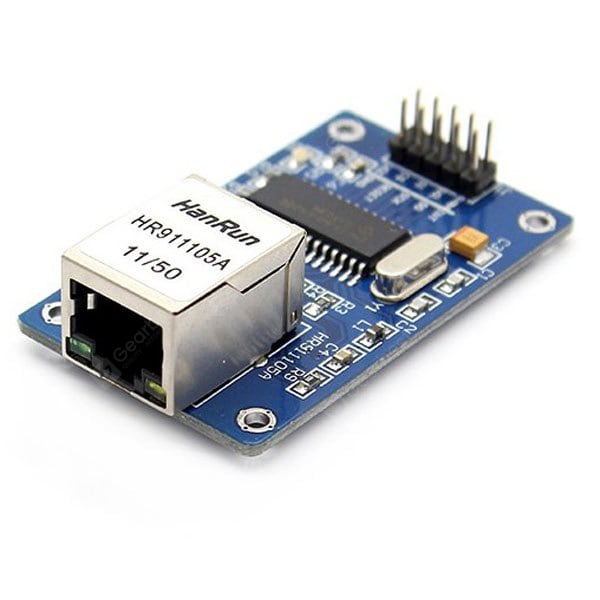Mbed library for ENC28J60 Ethernet modules. Full support for TCP/IP and UDP Server, Client and HTTP server (webserver). DHCP and DNS is included.
Dependents: mBuino_ENC28_MQTT Nucleo_Web_ENC28J60 Nucleo_Web_ENC28J60_ADC Serial_over_Ethernet ... more
Library for ENC28J60 Ethernet modules.

Ported to mbed from Norbert Truchsess's UIPEthernet library for Arduino. Thank you Norbert!
- Full support for persistent (streaming) TCP/IP and UDP connections Client and Server each, ARP, ICMP, DHCP and DNS.
- Works with both Mbed OS 2 and Mbed OS 5.
Usage:
- Import the library into your project.
- Add
#include "UipEthernet.h"tomain.cpp - Create one instance of the UipEthernet class initialized with the MAC address you'd like to use and SPI pins of the connected Mbed board.
Example programs:
Import programWebSwitch_ENC28J60
HTTP Server serving a simple webpage which enables to remotely turn a digital output on/off. Compile, download, run and type 'IP_address/secret/' (don't forget the last '/') into your web browser and hit ENTER.
Import programHTTPServer_Echo_ENC28J60
A simple HTTP server echoing received requests. Ethernet connection is over an ENC28J60 board. Usage: Type the server's IP address into you web browser and hit <ENTER>.
Import programTcpServer_ENC28J60
Simple TCP/IP Server using the UIPEthernet library for ENC28J60 Ethernet boards.
Import programTcpClient_ENC28J60
Simple TCP/IP Client using the UIPEthernet library for ENC28J60 Ethernet boards.
Import programUdpServer_ENC28J60
Simple UDP Server using the UIPEthernet library for ENC28J60 Ethernet boards.
Import programUdpClient_ENC28J60
Simple UDP Client using the UIPEthernet library for ENC28J60 Ethernet boards.
Import programMQTT_Hello_ENC28J60
MQTT Client example program. Ethernet connection is via an ENC28J60 module.
utility/stoip4.c
- Committer:
- hudakz
- Date:
- 2019-09-07
- Revision:
- 15:53715cc81c63
- Parent:
- 14:7648334eb41b
File content as of revision 15:53715cc81c63:
/*
* Copyright (c) 2014-2018 ARM Limited. All rights reserved.
* SPDX-License-Identifier: Apache-2.0
* Licensed under the Apache License, Version 2.0 (the License); you may
* not use this file except in compliance with the License.
* You may obtain a copy of the License at
*
* http://www.apache.org/licenses/LICENSE-2.0
*
* Unless required by applicable law or agreed to in writing, software
* distributed under the License is distributed on an AS IS BASIS, WITHOUT
* WARRANTIES OR CONDITIONS OF ANY KIND, either express or implied.
* See the License for the specific language governing permissions and
* limitations under the License.
*/
#include "mbed_version.h"
#if MBED_MAJOR_VERSION == 2
#include <string.h>
#include <stdlib.h>
#include <stdint.h>
#include "common_functions.h"
#include "ip4string.h"
/**
* Convert numeric IPv4 address string to a binary.
* \param ip4addr IPv4 address in string format.
* \param len Length of IPv4 string, maximum of 16..
* \param dest buffer for address. MUST be 4 bytes.
* \return boolean set to true if conversion succeded, false if it didn't
*/
bool stoip4(const char *ip4addr, size_t len, void *dest)
{
uint8_t *addr = dest;
if (len > 16) { // Too long, not possible
return false;
}
uint_fast8_t stringLength = 0, byteCount = 0;
//Iterate over each component of the IP. The exit condition is in the middle of the loop
while (true) {
//No valid character (IPv4 addresses don't have implicit 0, that is x.y..z being read as x.y.0.z)
if (stringLength == len || ip4addr[stringLength] < '0' || ip4addr[stringLength] > '9') {
return false;
}
//For each component, we convert it to the raw value
uint_fast16_t byte = 0;
while (stringLength < len && ip4addr[stringLength] >= '0' && ip4addr[stringLength] <= '9') {
byte *= 10;
byte += ip4addr[stringLength++] - '0';
//We go over the maximum value for an IPv4 component
if (byte > 0xff) {
return false;
}
}
//Append the component
addr[byteCount++] = (uint8_t) byte;
//If we're at the end, we leave the loop. It's the only way to reach the `true` output
if (byteCount == 4) {
break;
}
//If the next character is invalid, we return false
if (stringLength == len || ip4addr[stringLength++] != '.') {
return false;
}
}
return stringLength == len || ip4addr[stringLength] == '\0';
}
#endif
